A Psychoanalytic Analysis of Beethoven: A Sociology Essay
VerifiedAdded on 2023/01/18
|9
|2419
|99
Essay
AI Summary
This essay delves into a psychoanalytic analysis of Ludwig von Beethoven's life, examining his childhood experiences and the impact of family dynamics. The analysis explores the influence of his father's alcoholism and abusive behavior, and the role of his mother. It discusses the concept of the Oedipus complex as described by Freud, and how it may have manifested in Beethoven's relationships and personality. Furthermore, the essay investigates the defense mechanisms Beethoven developed to cope with his difficult circumstances, including his loneliness and emotional struggles. The study references relevant sociological theories and the works of scholars like Freud, Klein, and Winnicott to provide a comprehensive understanding of Beethoven's psychological development. The essay concludes by summarizing the key findings and emphasizing the connection between Beethoven's personal experiences and his artistic output.

Sociology
Wild analysis of Ludwig von Beethoven
Name
Professor
Course
Date
Wild analysis of Ludwig von Beethoven
Name
Professor
Course
Date
Paraphrase This Document
Need a fresh take? Get an instant paraphrase of this document with our AI Paraphraser
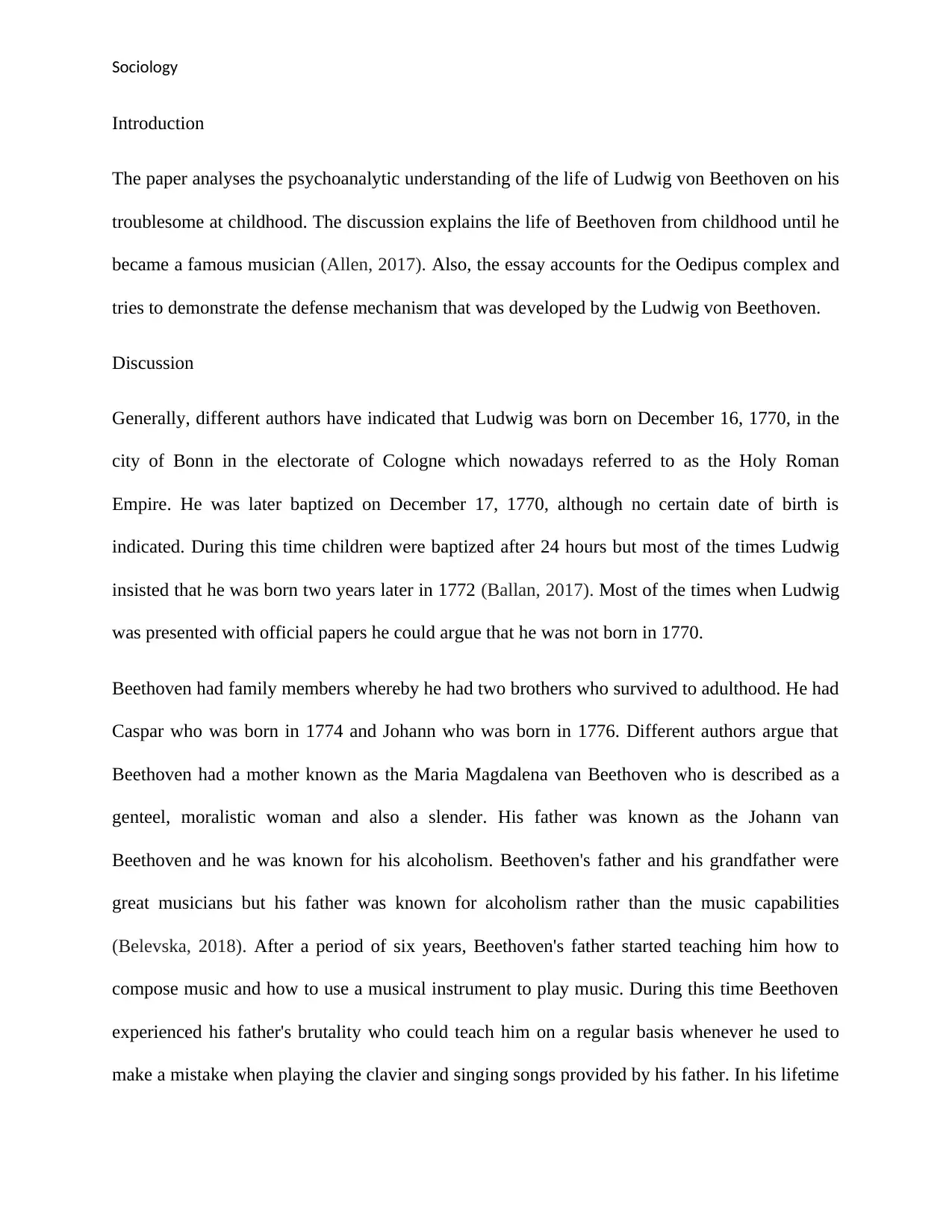
Sociology
Introduction
The paper analyses the psychoanalytic understanding of the life of Ludwig von Beethoven on his
troublesome at childhood. The discussion explains the life of Beethoven from childhood until he
became a famous musician (Allen, 2017). Also, the essay accounts for the Oedipus complex and
tries to demonstrate the defense mechanism that was developed by the Ludwig von Beethoven.
Discussion
Generally, different authors have indicated that Ludwig was born on December 16, 1770, in the
city of Bonn in the electorate of Cologne which nowadays referred to as the Holy Roman
Empire. He was later baptized on December 17, 1770, although no certain date of birth is
indicated. During this time children were baptized after 24 hours but most of the times Ludwig
insisted that he was born two years later in 1772 (Ballan, 2017). Most of the times when Ludwig
was presented with official papers he could argue that he was not born in 1770.
Beethoven had family members whereby he had two brothers who survived to adulthood. He had
Caspar who was born in 1774 and Johann who was born in 1776. Different authors argue that
Beethoven had a mother known as the Maria Magdalena van Beethoven who is described as a
genteel, moralistic woman and also a slender. His father was known as the Johann van
Beethoven and he was known for his alcoholism. Beethoven's father and his grandfather were
great musicians but his father was known for alcoholism rather than the music capabilities
(Belevska, 2018). After a period of six years, Beethoven's father started teaching him how to
compose music and how to use a musical instrument to play music. During this time Beethoven
experienced his father's brutality who could teach him on a regular basis whenever he used to
make a mistake when playing the clavier and singing songs provided by his father. In his lifetime
Introduction
The paper analyses the psychoanalytic understanding of the life of Ludwig von Beethoven on his
troublesome at childhood. The discussion explains the life of Beethoven from childhood until he
became a famous musician (Allen, 2017). Also, the essay accounts for the Oedipus complex and
tries to demonstrate the defense mechanism that was developed by the Ludwig von Beethoven.
Discussion
Generally, different authors have indicated that Ludwig was born on December 16, 1770, in the
city of Bonn in the electorate of Cologne which nowadays referred to as the Holy Roman
Empire. He was later baptized on December 17, 1770, although no certain date of birth is
indicated. During this time children were baptized after 24 hours but most of the times Ludwig
insisted that he was born two years later in 1772 (Ballan, 2017). Most of the times when Ludwig
was presented with official papers he could argue that he was not born in 1770.
Beethoven had family members whereby he had two brothers who survived to adulthood. He had
Caspar who was born in 1774 and Johann who was born in 1776. Different authors argue that
Beethoven had a mother known as the Maria Magdalena van Beethoven who is described as a
genteel, moralistic woman and also a slender. His father was known as the Johann van
Beethoven and he was known for his alcoholism. Beethoven's father and his grandfather were
great musicians but his father was known for alcoholism rather than the music capabilities
(Belevska, 2018). After a period of six years, Beethoven's father started teaching him how to
compose music and how to use a musical instrument to play music. During this time Beethoven
experienced his father's brutality who could teach him on a regular basis whenever he used to
make a mistake when playing the clavier and singing songs provided by his father. In his lifetime
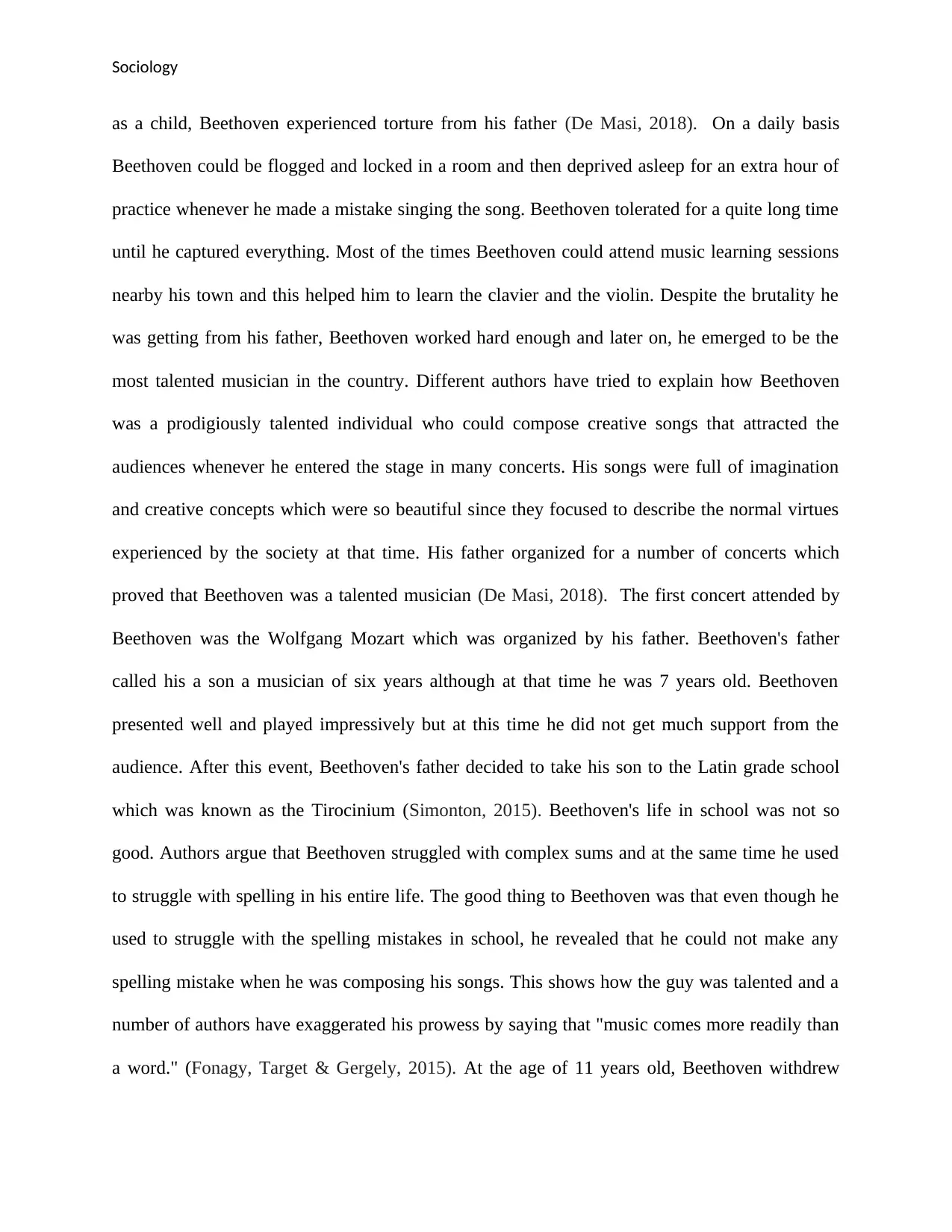
Sociology
as a child, Beethoven experienced torture from his father (De Masi, 2018). On a daily basis
Beethoven could be flogged and locked in a room and then deprived asleep for an extra hour of
practice whenever he made a mistake singing the song. Beethoven tolerated for a quite long time
until he captured everything. Most of the times Beethoven could attend music learning sessions
nearby his town and this helped him to learn the clavier and the violin. Despite the brutality he
was getting from his father, Beethoven worked hard enough and later on, he emerged to be the
most talented musician in the country. Different authors have tried to explain how Beethoven
was a prodigiously talented individual who could compose creative songs that attracted the
audiences whenever he entered the stage in many concerts. His songs were full of imagination
and creative concepts which were so beautiful since they focused to describe the normal virtues
experienced by the society at that time. His father organized for a number of concerts which
proved that Beethoven was a talented musician (De Masi, 2018). The first concert attended by
Beethoven was the Wolfgang Mozart which was organized by his father. Beethoven's father
called his a son a musician of six years although at that time he was 7 years old. Beethoven
presented well and played impressively but at this time he did not get much support from the
audience. After this event, Beethoven's father decided to take his son to the Latin grade school
which was known as the Tirocinium (Simonton, 2015). Beethoven's life in school was not so
good. Authors argue that Beethoven struggled with complex sums and at the same time he used
to struggle with spelling in his entire life. The good thing to Beethoven was that even though he
used to struggle with the spelling mistakes in school, he revealed that he could not make any
spelling mistake when he was composing his songs. This shows how the guy was talented and a
number of authors have exaggerated his prowess by saying that "music comes more readily than
a word." (Fonagy, Target & Gergely, 2015). At the age of 11 years old, Beethoven withdrew
as a child, Beethoven experienced torture from his father (De Masi, 2018). On a daily basis
Beethoven could be flogged and locked in a room and then deprived asleep for an extra hour of
practice whenever he made a mistake singing the song. Beethoven tolerated for a quite long time
until he captured everything. Most of the times Beethoven could attend music learning sessions
nearby his town and this helped him to learn the clavier and the violin. Despite the brutality he
was getting from his father, Beethoven worked hard enough and later on, he emerged to be the
most talented musician in the country. Different authors have tried to explain how Beethoven
was a prodigiously talented individual who could compose creative songs that attracted the
audiences whenever he entered the stage in many concerts. His songs were full of imagination
and creative concepts which were so beautiful since they focused to describe the normal virtues
experienced by the society at that time. His father organized for a number of concerts which
proved that Beethoven was a talented musician (De Masi, 2018). The first concert attended by
Beethoven was the Wolfgang Mozart which was organized by his father. Beethoven's father
called his a son a musician of six years although at that time he was 7 years old. Beethoven
presented well and played impressively but at this time he did not get much support from the
audience. After this event, Beethoven's father decided to take his son to the Latin grade school
which was known as the Tirocinium (Simonton, 2015). Beethoven's life in school was not so
good. Authors argue that Beethoven struggled with complex sums and at the same time he used
to struggle with spelling in his entire life. The good thing to Beethoven was that even though he
used to struggle with the spelling mistakes in school, he revealed that he could not make any
spelling mistake when he was composing his songs. This shows how the guy was talented and a
number of authors have exaggerated his prowess by saying that "music comes more readily than
a word." (Fonagy, Target & Gergely, 2015). At the age of 11 years old, Beethoven withdrew
⊘ This is a preview!⊘
Do you want full access?
Subscribe today to unlock all pages.

Trusted by 1+ million students worldwide
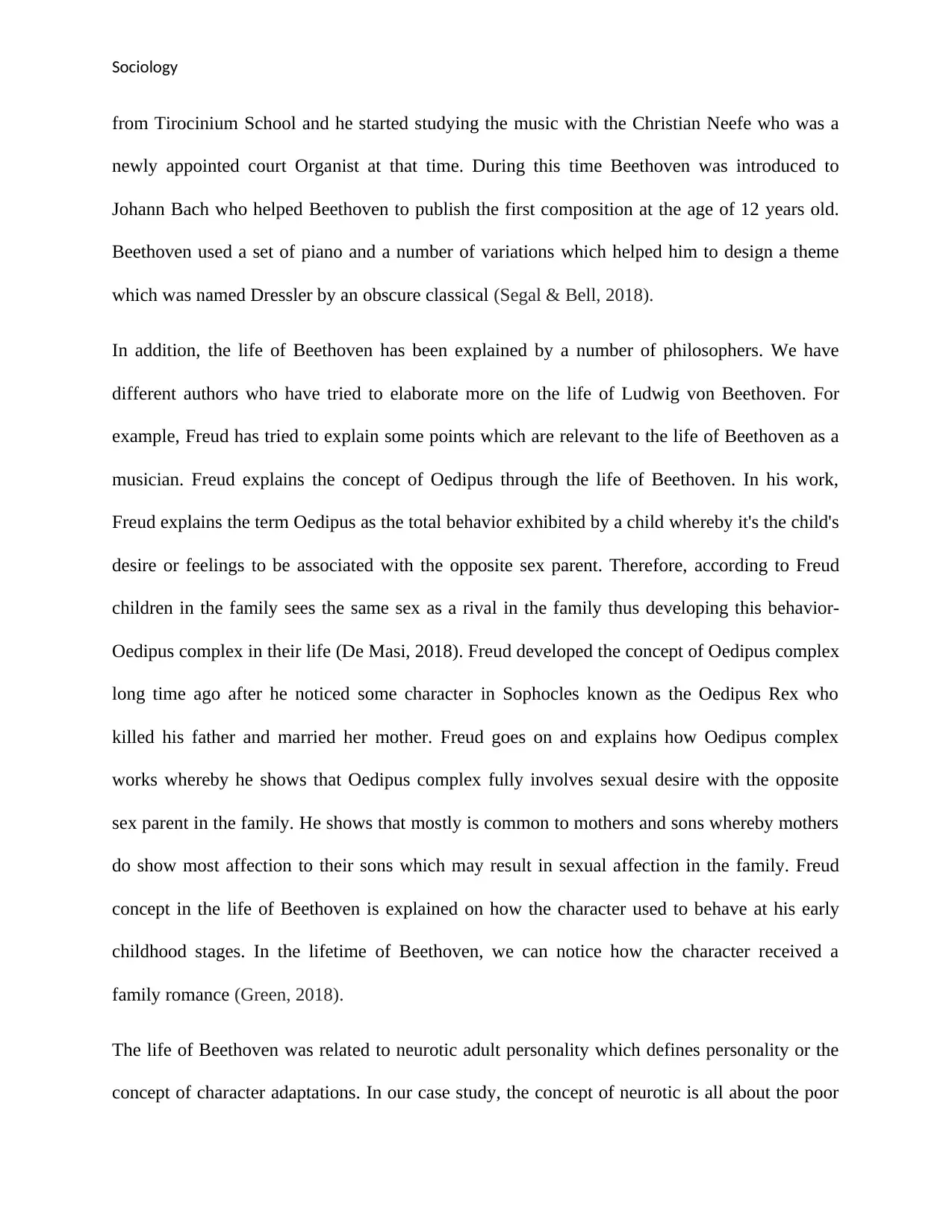
Sociology
from Tirocinium School and he started studying the music with the Christian Neefe who was a
newly appointed court Organist at that time. During this time Beethoven was introduced to
Johann Bach who helped Beethoven to publish the first composition at the age of 12 years old.
Beethoven used a set of piano and a number of variations which helped him to design a theme
which was named Dressler by an obscure classical (Segal & Bell, 2018).
In addition, the life of Beethoven has been explained by a number of philosophers. We have
different authors who have tried to elaborate more on the life of Ludwig von Beethoven. For
example, Freud has tried to explain some points which are relevant to the life of Beethoven as a
musician. Freud explains the concept of Oedipus through the life of Beethoven. In his work,
Freud explains the term Oedipus as the total behavior exhibited by a child whereby it's the child's
desire or feelings to be associated with the opposite sex parent. Therefore, according to Freud
children in the family sees the same sex as a rival in the family thus developing this behavior-
Oedipus complex in their life (De Masi, 2018). Freud developed the concept of Oedipus complex
long time ago after he noticed some character in Sophocles known as the Oedipus Rex who
killed his father and married her mother. Freud goes on and explains how Oedipus complex
works whereby he shows that Oedipus complex fully involves sexual desire with the opposite
sex parent in the family. He shows that mostly is common to mothers and sons whereby mothers
do show most affection to their sons which may result in sexual affection in the family. Freud
concept in the life of Beethoven is explained on how the character used to behave at his early
childhood stages. In the lifetime of Beethoven, we can notice how the character received a
family romance (Green, 2018).
The life of Beethoven was related to neurotic adult personality which defines personality or the
concept of character adaptations. In our case study, the concept of neurotic is all about the poor
from Tirocinium School and he started studying the music with the Christian Neefe who was a
newly appointed court Organist at that time. During this time Beethoven was introduced to
Johann Bach who helped Beethoven to publish the first composition at the age of 12 years old.
Beethoven used a set of piano and a number of variations which helped him to design a theme
which was named Dressler by an obscure classical (Segal & Bell, 2018).
In addition, the life of Beethoven has been explained by a number of philosophers. We have
different authors who have tried to elaborate more on the life of Ludwig von Beethoven. For
example, Freud has tried to explain some points which are relevant to the life of Beethoven as a
musician. Freud explains the concept of Oedipus through the life of Beethoven. In his work,
Freud explains the term Oedipus as the total behavior exhibited by a child whereby it's the child's
desire or feelings to be associated with the opposite sex parent. Therefore, according to Freud
children in the family sees the same sex as a rival in the family thus developing this behavior-
Oedipus complex in their life (De Masi, 2018). Freud developed the concept of Oedipus complex
long time ago after he noticed some character in Sophocles known as the Oedipus Rex who
killed his father and married her mother. Freud goes on and explains how Oedipus complex
works whereby he shows that Oedipus complex fully involves sexual desire with the opposite
sex parent in the family. He shows that mostly is common to mothers and sons whereby mothers
do show most affection to their sons which may result in sexual affection in the family. Freud
concept in the life of Beethoven is explained on how the character used to behave at his early
childhood stages. In the lifetime of Beethoven, we can notice how the character received a
family romance (Green, 2018).
The life of Beethoven was related to neurotic adult personality which defines personality or the
concept of character adaptations. In our case study, the concept of neurotic is all about the poor
Paraphrase This Document
Need a fresh take? Get an instant paraphrase of this document with our AI Paraphraser
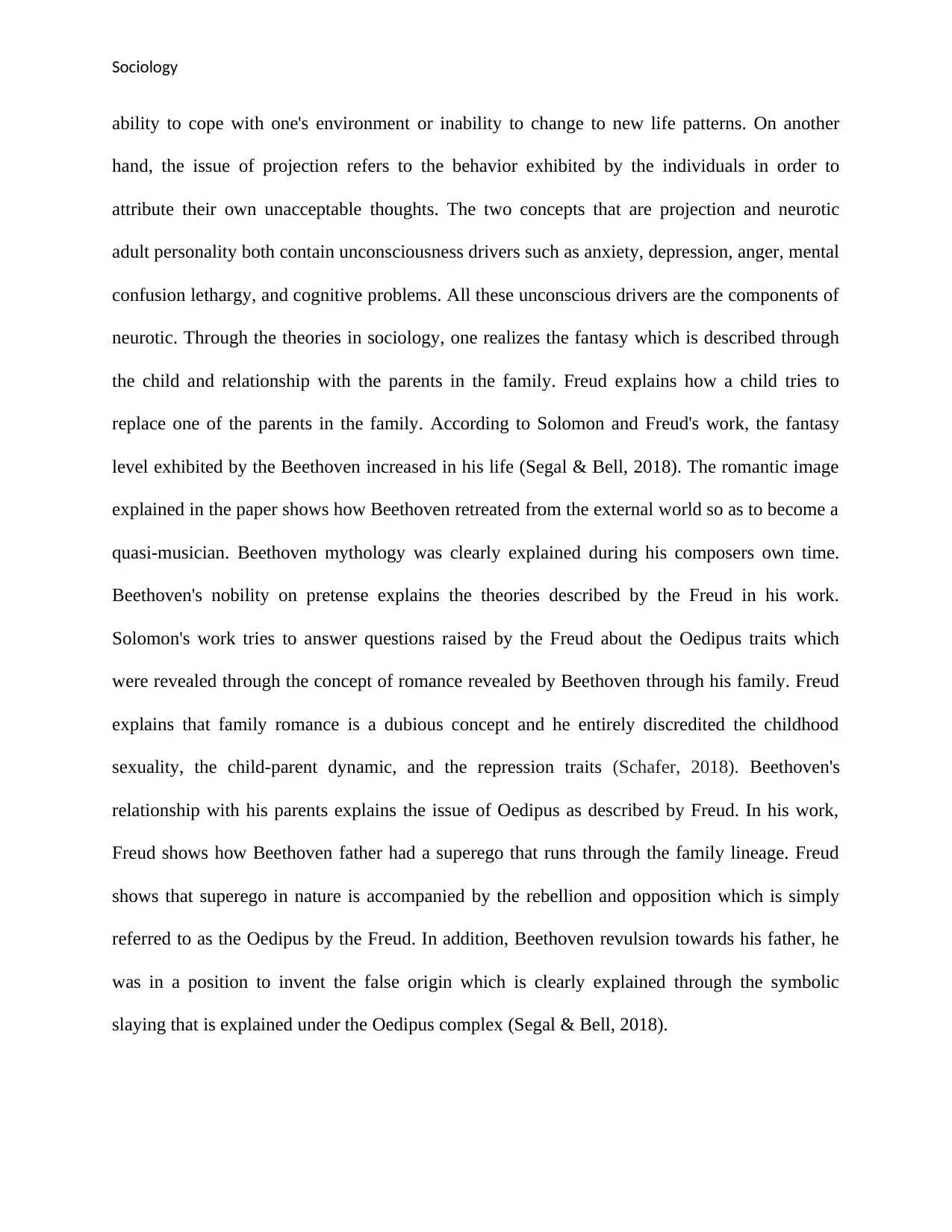
Sociology
ability to cope with one's environment or inability to change to new life patterns. On another
hand, the issue of projection refers to the behavior exhibited by the individuals in order to
attribute their own unacceptable thoughts. The two concepts that are projection and neurotic
adult personality both contain unconsciousness drivers such as anxiety, depression, anger, mental
confusion lethargy, and cognitive problems. All these unconscious drivers are the components of
neurotic. Through the theories in sociology, one realizes the fantasy which is described through
the child and relationship with the parents in the family. Freud explains how a child tries to
replace one of the parents in the family. According to Solomon and Freud's work, the fantasy
level exhibited by the Beethoven increased in his life (Segal & Bell, 2018). The romantic image
explained in the paper shows how Beethoven retreated from the external world so as to become a
quasi-musician. Beethoven mythology was clearly explained during his composers own time.
Beethoven's nobility on pretense explains the theories described by the Freud in his work.
Solomon's work tries to answer questions raised by the Freud about the Oedipus traits which
were revealed through the concept of romance revealed by Beethoven through his family. Freud
explains that family romance is a dubious concept and he entirely discredited the childhood
sexuality, the child-parent dynamic, and the repression traits (Schafer, 2018). Beethoven's
relationship with his parents explains the issue of Oedipus as described by Freud. In his work,
Freud shows how Beethoven father had a superego that runs through the family lineage. Freud
shows that superego in nature is accompanied by the rebellion and opposition which is simply
referred to as the Oedipus by the Freud. In addition, Beethoven revulsion towards his father, he
was in a position to invent the false origin which is clearly explained through the symbolic
slaying that is explained under the Oedipus complex (Segal & Bell, 2018).
ability to cope with one's environment or inability to change to new life patterns. On another
hand, the issue of projection refers to the behavior exhibited by the individuals in order to
attribute their own unacceptable thoughts. The two concepts that are projection and neurotic
adult personality both contain unconsciousness drivers such as anxiety, depression, anger, mental
confusion lethargy, and cognitive problems. All these unconscious drivers are the components of
neurotic. Through the theories in sociology, one realizes the fantasy which is described through
the child and relationship with the parents in the family. Freud explains how a child tries to
replace one of the parents in the family. According to Solomon and Freud's work, the fantasy
level exhibited by the Beethoven increased in his life (Segal & Bell, 2018). The romantic image
explained in the paper shows how Beethoven retreated from the external world so as to become a
quasi-musician. Beethoven mythology was clearly explained during his composers own time.
Beethoven's nobility on pretense explains the theories described by the Freud in his work.
Solomon's work tries to answer questions raised by the Freud about the Oedipus traits which
were revealed through the concept of romance revealed by Beethoven through his family. Freud
explains that family romance is a dubious concept and he entirely discredited the childhood
sexuality, the child-parent dynamic, and the repression traits (Schafer, 2018). Beethoven's
relationship with his parents explains the issue of Oedipus as described by Freud. In his work,
Freud shows how Beethoven father had a superego that runs through the family lineage. Freud
shows that superego in nature is accompanied by the rebellion and opposition which is simply
referred to as the Oedipus by the Freud. In addition, Beethoven revulsion towards his father, he
was in a position to invent the false origin which is clearly explained through the symbolic
slaying that is explained under the Oedipus complex (Segal & Bell, 2018).
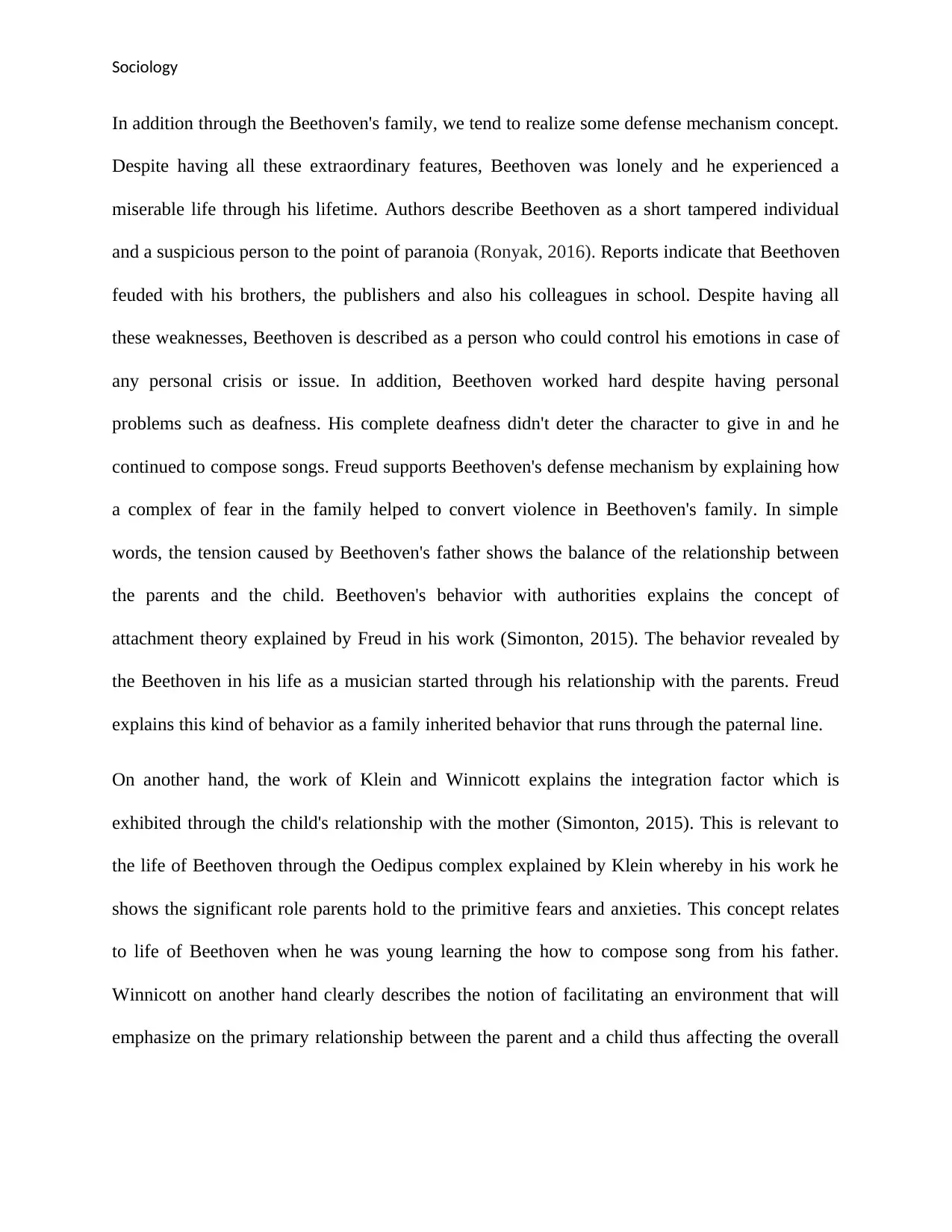
Sociology
In addition through the Beethoven's family, we tend to realize some defense mechanism concept.
Despite having all these extraordinary features, Beethoven was lonely and he experienced a
miserable life through his lifetime. Authors describe Beethoven as a short tampered individual
and a suspicious person to the point of paranoia (Ronyak, 2016). Reports indicate that Beethoven
feuded with his brothers, the publishers and also his colleagues in school. Despite having all
these weaknesses, Beethoven is described as a person who could control his emotions in case of
any personal crisis or issue. In addition, Beethoven worked hard despite having personal
problems such as deafness. His complete deafness didn't deter the character to give in and he
continued to compose songs. Freud supports Beethoven's defense mechanism by explaining how
a complex of fear in the family helped to convert violence in Beethoven's family. In simple
words, the tension caused by Beethoven's father shows the balance of the relationship between
the parents and the child. Beethoven's behavior with authorities explains the concept of
attachment theory explained by Freud in his work (Simonton, 2015). The behavior revealed by
the Beethoven in his life as a musician started through his relationship with the parents. Freud
explains this kind of behavior as a family inherited behavior that runs through the paternal line.
On another hand, the work of Klein and Winnicott explains the integration factor which is
exhibited through the child's relationship with the mother (Simonton, 2015). This is relevant to
the life of Beethoven through the Oedipus complex explained by Klein whereby in his work he
shows the significant role parents hold to the primitive fears and anxieties. This concept relates
to life of Beethoven when he was young learning the how to compose song from his father.
Winnicott on another hand clearly describes the notion of facilitating an environment that will
emphasize on the primary relationship between the parent and a child thus affecting the overall
In addition through the Beethoven's family, we tend to realize some defense mechanism concept.
Despite having all these extraordinary features, Beethoven was lonely and he experienced a
miserable life through his lifetime. Authors describe Beethoven as a short tampered individual
and a suspicious person to the point of paranoia (Ronyak, 2016). Reports indicate that Beethoven
feuded with his brothers, the publishers and also his colleagues in school. Despite having all
these weaknesses, Beethoven is described as a person who could control his emotions in case of
any personal crisis or issue. In addition, Beethoven worked hard despite having personal
problems such as deafness. His complete deafness didn't deter the character to give in and he
continued to compose songs. Freud supports Beethoven's defense mechanism by explaining how
a complex of fear in the family helped to convert violence in Beethoven's family. In simple
words, the tension caused by Beethoven's father shows the balance of the relationship between
the parents and the child. Beethoven's behavior with authorities explains the concept of
attachment theory explained by Freud in his work (Simonton, 2015). The behavior revealed by
the Beethoven in his life as a musician started through his relationship with the parents. Freud
explains this kind of behavior as a family inherited behavior that runs through the paternal line.
On another hand, the work of Klein and Winnicott explains the integration factor which is
exhibited through the child's relationship with the mother (Simonton, 2015). This is relevant to
the life of Beethoven through the Oedipus complex explained by Klein whereby in his work he
shows the significant role parents hold to the primitive fears and anxieties. This concept relates
to life of Beethoven when he was young learning the how to compose song from his father.
Winnicott on another hand clearly describes the notion of facilitating an environment that will
emphasize on the primary relationship between the parent and a child thus affecting the overall
⊘ This is a preview!⊘
Do you want full access?
Subscribe today to unlock all pages.

Trusted by 1+ million students worldwide
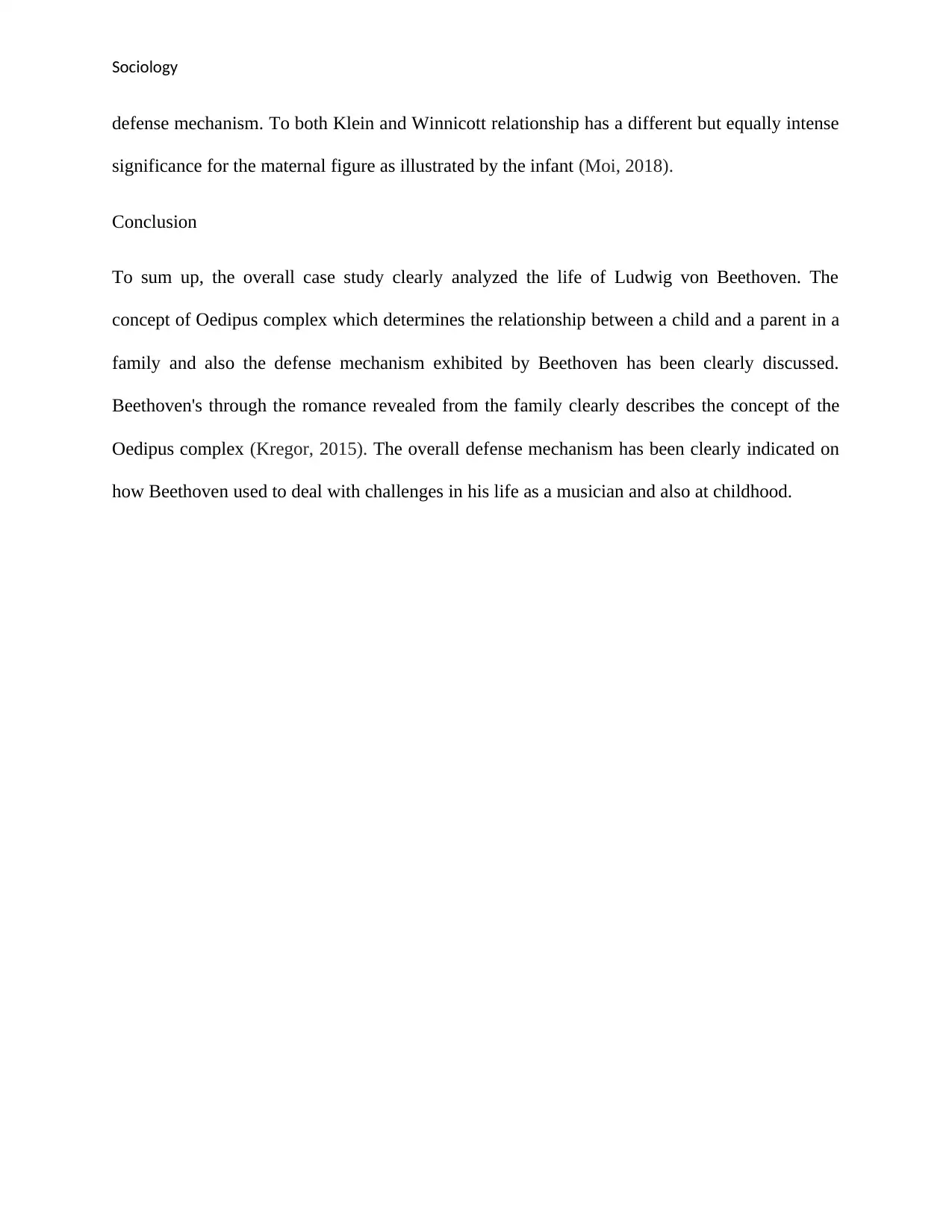
Sociology
defense mechanism. To both Klein and Winnicott relationship has a different but equally intense
significance for the maternal figure as illustrated by the infant (Moi, 2018).
Conclusion
To sum up, the overall case study clearly analyzed the life of Ludwig von Beethoven. The
concept of Oedipus complex which determines the relationship between a child and a parent in a
family and also the defense mechanism exhibited by Beethoven has been clearly discussed.
Beethoven's through the romance revealed from the family clearly describes the concept of the
Oedipus complex (Kregor, 2015). The overall defense mechanism has been clearly indicated on
how Beethoven used to deal with challenges in his life as a musician and also at childhood.
defense mechanism. To both Klein and Winnicott relationship has a different but equally intense
significance for the maternal figure as illustrated by the infant (Moi, 2018).
Conclusion
To sum up, the overall case study clearly analyzed the life of Ludwig von Beethoven. The
concept of Oedipus complex which determines the relationship between a child and a parent in a
family and also the defense mechanism exhibited by Beethoven has been clearly discussed.
Beethoven's through the romance revealed from the family clearly describes the concept of the
Oedipus complex (Kregor, 2015). The overall defense mechanism has been clearly indicated on
how Beethoven used to deal with challenges in his life as a musician and also at childhood.
Paraphrase This Document
Need a fresh take? Get an instant paraphrase of this document with our AI Paraphraser
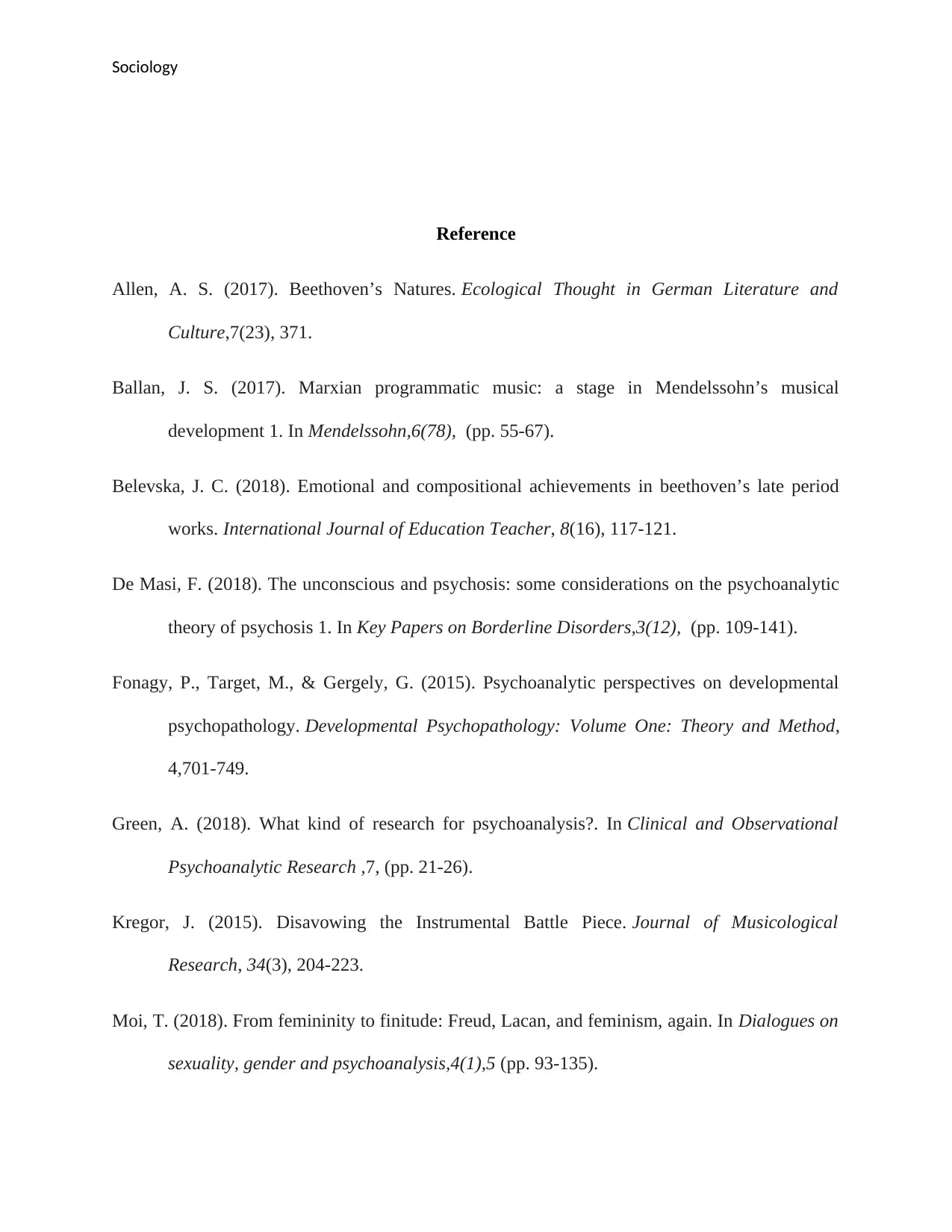
Sociology
Reference
Allen, A. S. (2017). Beethoven’s Natures. Ecological Thought in German Literature and
Culture,7(23), 371.
Ballan, J. S. (2017). Marxian programmatic music: a stage in Mendelssohn’s musical
development 1. In Mendelssohn,6(78), (pp. 55-67).
Belevska, J. C. (2018). Emotional and compositional achievements in beethoven’s late period
works. International Journal of Education Teacher, 8(16), 117-121.
De Masi, F. (2018). The unconscious and psychosis: some considerations on the psychoanalytic
theory of psychosis 1. In Key Papers on Borderline Disorders,3(12), (pp. 109-141).
Fonagy, P., Target, M., & Gergely, G. (2015). Psychoanalytic perspectives on developmental
psychopathology. Developmental Psychopathology: Volume One: Theory and Method,
4,701-749.
Green, A. (2018). What kind of research for psychoanalysis?. In Clinical and Observational
Psychoanalytic Research ,7, (pp. 21-26).
Kregor, J. (2015). Disavowing the Instrumental Battle Piece. Journal of Musicological
Research, 34(3), 204-223.
Moi, T. (2018). From femininity to finitude: Freud, Lacan, and feminism, again. In Dialogues on
sexuality, gender and psychoanalysis,4(1),5 (pp. 93-135).
Reference
Allen, A. S. (2017). Beethoven’s Natures. Ecological Thought in German Literature and
Culture,7(23), 371.
Ballan, J. S. (2017). Marxian programmatic music: a stage in Mendelssohn’s musical
development 1. In Mendelssohn,6(78), (pp. 55-67).
Belevska, J. C. (2018). Emotional and compositional achievements in beethoven’s late period
works. International Journal of Education Teacher, 8(16), 117-121.
De Masi, F. (2018). The unconscious and psychosis: some considerations on the psychoanalytic
theory of psychosis 1. In Key Papers on Borderline Disorders,3(12), (pp. 109-141).
Fonagy, P., Target, M., & Gergely, G. (2015). Psychoanalytic perspectives on developmental
psychopathology. Developmental Psychopathology: Volume One: Theory and Method,
4,701-749.
Green, A. (2018). What kind of research for psychoanalysis?. In Clinical and Observational
Psychoanalytic Research ,7, (pp. 21-26).
Kregor, J. (2015). Disavowing the Instrumental Battle Piece. Journal of Musicological
Research, 34(3), 204-223.
Moi, T. (2018). From femininity to finitude: Freud, Lacan, and feminism, again. In Dialogues on
sexuality, gender and psychoanalysis,4(1),5 (pp. 93-135).
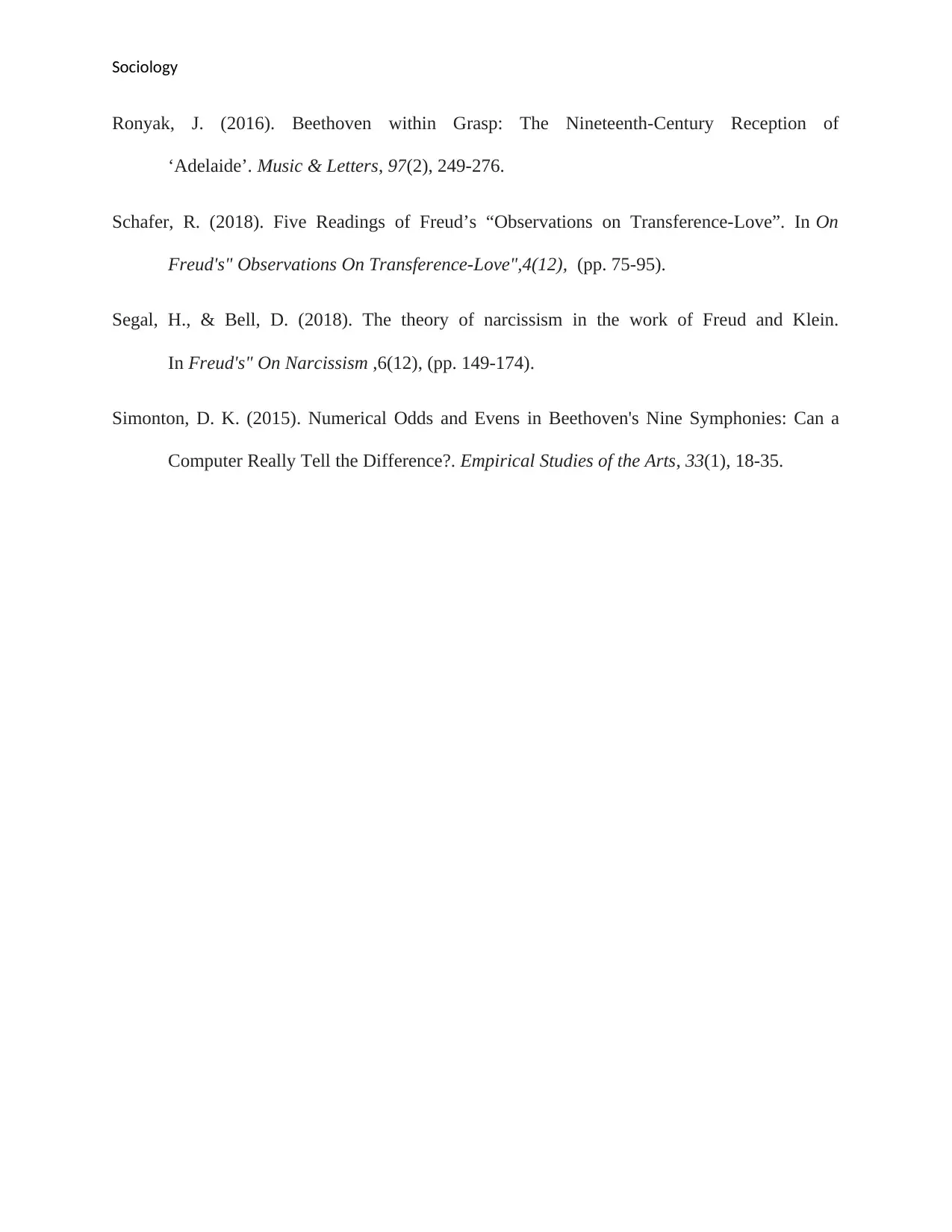
Sociology
Ronyak, J. (2016). Beethoven within Grasp: The Nineteenth-Century Reception of
‘Adelaide’. Music & Letters, 97(2), 249-276.
Schafer, R. (2018). Five Readings of Freud’s “Observations on Transference-Love”. In On
Freud's" Observations On Transference-Love",4(12), (pp. 75-95).
Segal, H., & Bell, D. (2018). The theory of narcissism in the work of Freud and Klein.
In Freud's" On Narcissism ,6(12), (pp. 149-174).
Simonton, D. K. (2015). Numerical Odds and Evens in Beethoven's Nine Symphonies: Can a
Computer Really Tell the Difference?. Empirical Studies of the Arts, 33(1), 18-35.
Ronyak, J. (2016). Beethoven within Grasp: The Nineteenth-Century Reception of
‘Adelaide’. Music & Letters, 97(2), 249-276.
Schafer, R. (2018). Five Readings of Freud’s “Observations on Transference-Love”. In On
Freud's" Observations On Transference-Love",4(12), (pp. 75-95).
Segal, H., & Bell, D. (2018). The theory of narcissism in the work of Freud and Klein.
In Freud's" On Narcissism ,6(12), (pp. 149-174).
Simonton, D. K. (2015). Numerical Odds and Evens in Beethoven's Nine Symphonies: Can a
Computer Really Tell the Difference?. Empirical Studies of the Arts, 33(1), 18-35.
⊘ This is a preview!⊘
Do you want full access?
Subscribe today to unlock all pages.

Trusted by 1+ million students worldwide
1 out of 9
Related Documents
Your All-in-One AI-Powered Toolkit for Academic Success.
+13062052269
info@desklib.com
Available 24*7 on WhatsApp / Email
![[object Object]](/_next/static/media/star-bottom.7253800d.svg)
Unlock your academic potential
Copyright © 2020–2026 A2Z Services. All Rights Reserved. Developed and managed by ZUCOL.



